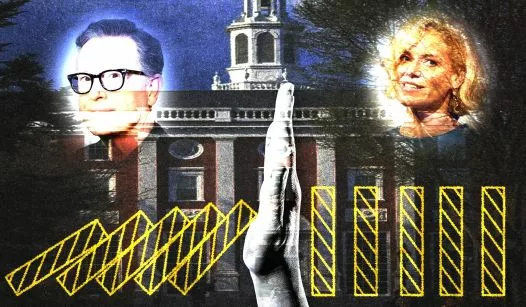In recent years, a significant shift has been observed in political discourse across the United States, particularly regarding the progressive movement. From prestigious academic institutions like Harvard to influential media outlets such as the Los Angeles Times, the traditional exchanges of support and influence that have long characterized the left’s agenda are beginning to unravel. This article explores the implications of this development and what it means for the future of progressive politics in America.
The progressive movement has historically thrived on a network of alliances between academia, media, and political institutions. These connections have enabled the left to shape public opinion, influence policy, and mobilize support for various causes. However, recent events suggest that this once-cohesive coalition is facing unprecedented challenges.
One of the most significant factors contributing to this shift is the growing skepticism among younger generations towards established institutions. Many young people are increasingly disillusioned with traditional media and academic elites, perceiving them as out of touch with the realities of everyday life. This disenchantment has been amplified by the rise of social media, which has provided alternative platforms for political discourse and activism. As a result, the left’s ability to control the narrative and rally support around its initiatives is being tested like never before.
Moreover, the political landscape is becoming more polarized, complicating the left’s efforts to build broad coalitions. As the Democratic Party grapples with internal divisions between moderates and progressives, the once-unified front is now fragmented. This discord is evident in various policy debates, from healthcare reform to climate change initiatives, where competing visions for the future of the party are increasingly at odds.
In addition, the backlash against political correctness and “woke” culture has gained traction among conservative circles, further complicating the left’s messaging. Critics argue that the movement has become overly focused on identity politics, alienating potential allies and creating an environment where open dialogue is stifled. This perception has led to a growing sense of urgency among conservatives to push back against what they see as an overreach of progressive ideals, resulting in a more contentious political climate.
The media landscape itself is also undergoing a transformation. Traditional outlets that once served as the primary vehicles for progressive ideas are now facing competition from a myriad of digital platforms that cater to diverse viewpoints. As audiences increasingly turn to alternative sources for news and commentary, the left’s ability to disseminate its message effectively is being challenged. This shift has forced progressive leaders to adapt their strategies, seeking new ways to engage with voters and communicate their vision for the future.
Despite these challenges, there are signs that the left is beginning to recalibrate its approach. Many progressive leaders are recognizing the need for a more inclusive and nuanced dialogue that addresses the concerns of a broader constituency. By focusing on issues that resonate with everyday Americans—such as economic inequality, healthcare access, and climate change—the left can work to rebuild its coalition and regain the trust of disillusioned voters.
Furthermore, grassroots movements continue to play a crucial role in shaping the political landscape. Organizations that prioritize community engagement and local activism are emerging as powerful forces within the progressive movement. By harnessing the energy and enthusiasm of grassroots supporters, the left can create a more dynamic and responsive political agenda that reflects the needs and aspirations of diverse communities.
In conclusion, the left’s long march through American politics is encountering significant obstacles, but it is not without hope. As the movement adapts to the changing landscape, it has the opportunity to redefine its narrative and reconnect with the American public. By fostering open dialogue, embracing inclusivity, and prioritizing the issues that matter most to everyday citizens, the left can navigate these challenges and continue its pursuit of a more equitable and just society. The road ahead may be fraught with difficulties, but the resilience of progressive ideals and the determination of its advocates will be crucial in shaping the future of American politics.
